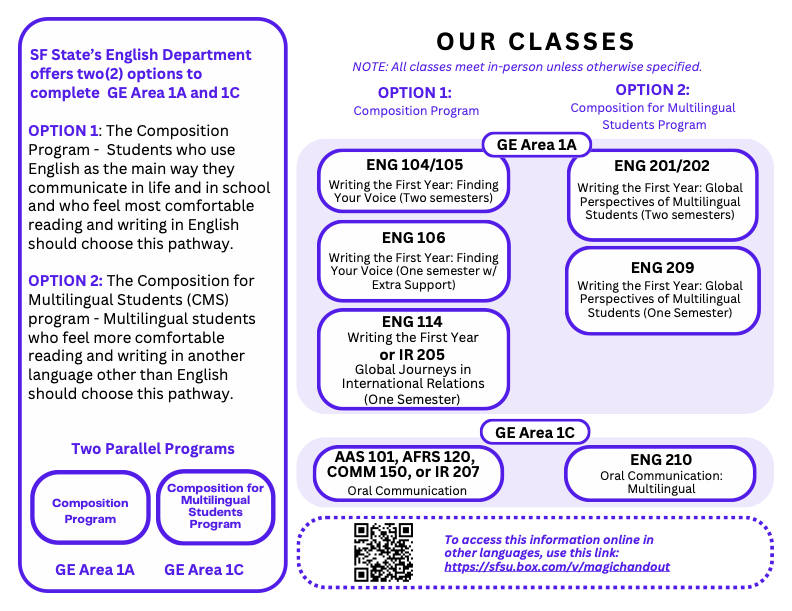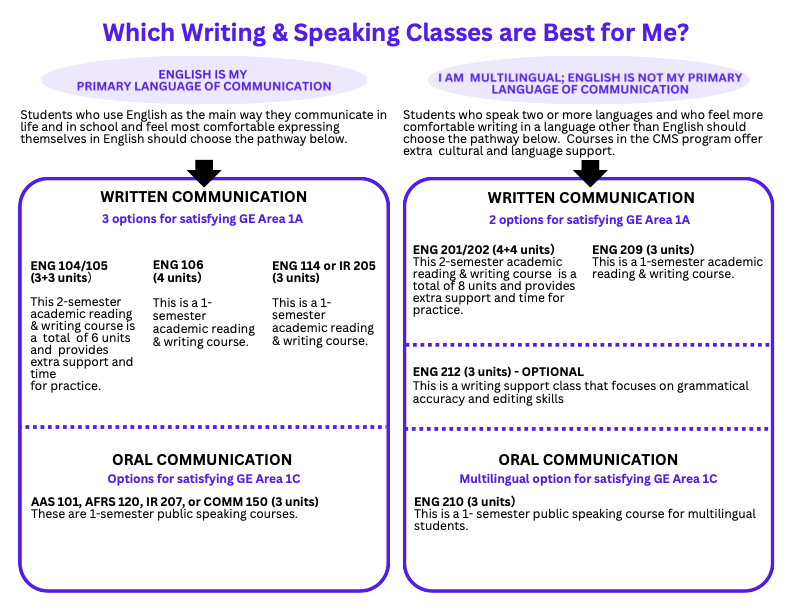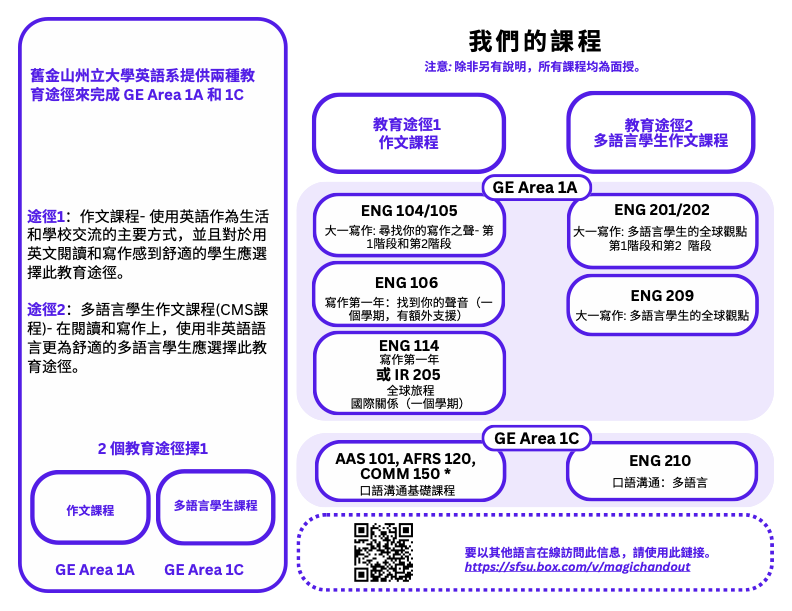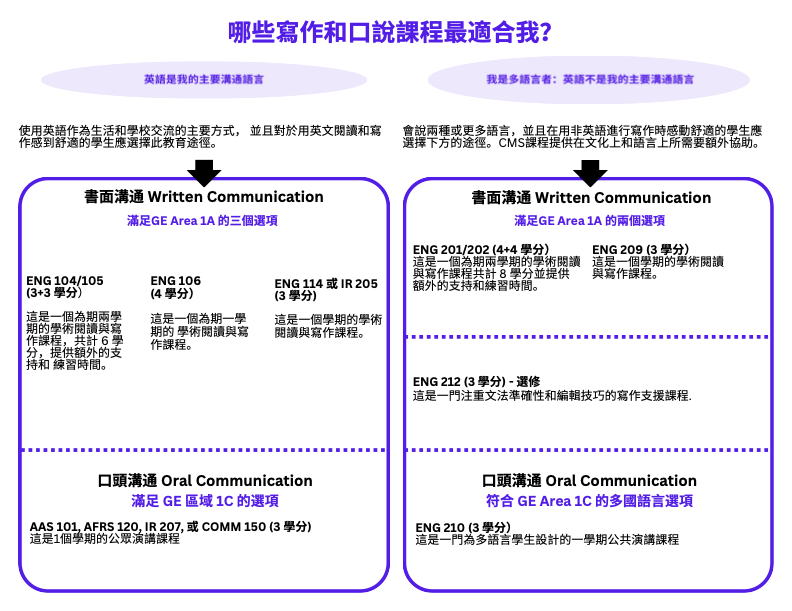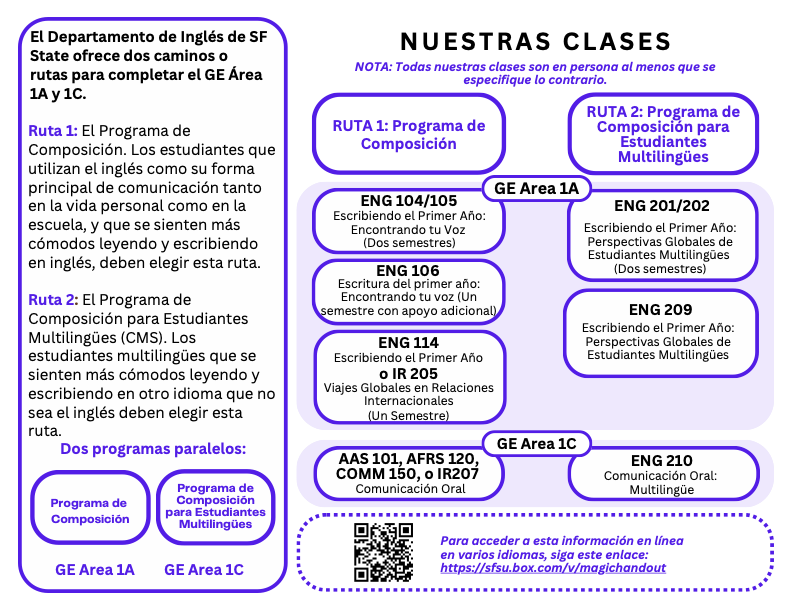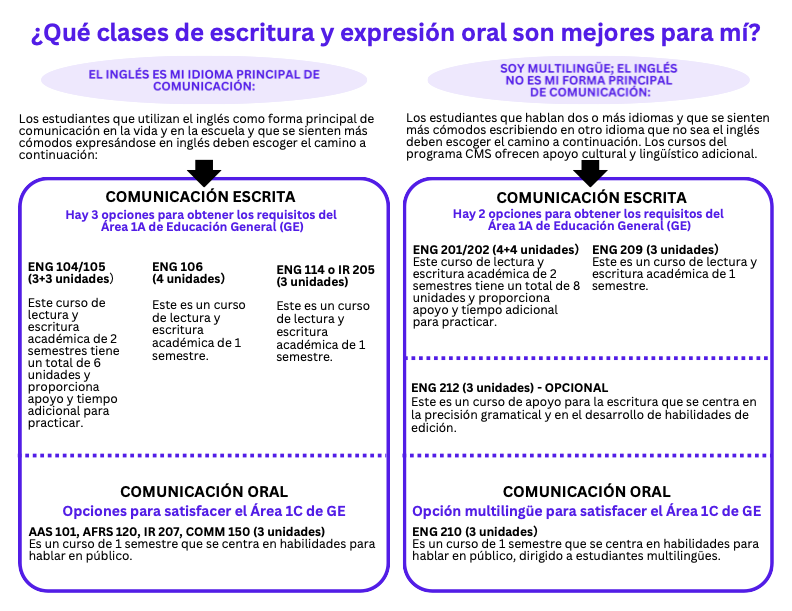Composition for Multilingual Students (CMS) is a university-wide undergraduate program that offers multilingual speakers the opportunity to fulfill general education requirements in courses tailored for students new to U.S. academic culture. These courses support the development of academic communication skills in a supportive and collaborative environment with other multilingual students.
To learn more about our CMS courses, you can find course descriptions in 10 different languages below.
Composición para Estudiantes Multilingües (CMS) es un programa universitario de grado que ofrece a hablantes multilingües la oportunidad de cumplir con los requisitos de educación general en cursos diseñados para estudiantes que se inician en la cultura académica estadounidense. Estos cursos fomentan el desarrollo de habilidades de comunicación académica en un entorno de apoyo y colaboración con otros estudiantes multilingües.
多語言學生作文 (CMS) 是一項全校範圍的本科課程,為多語言使用者提供機會,透過為剛接觸美國學術文化的學生量身定制的課程來滿足通識教育的要求。這些課程支持在與其他多語言學生的支持性和協作環境中發展學術溝通技巧。
要了解有關我們的 CMS 課程的更多信息,您可以在下面找到 10 種不同語言的課程描述。
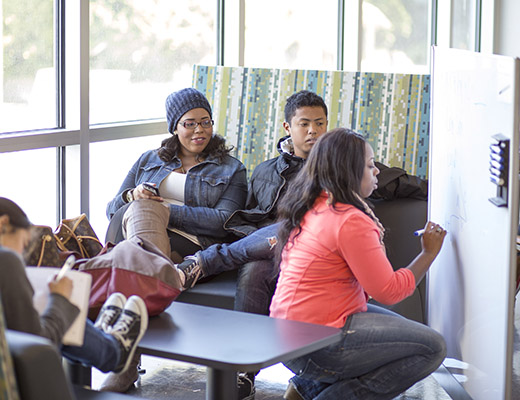
Multilingual Students and Gwar
Who is a Multilingual Student?
A multilingual student is one for whom English is their second language and who most likely do not speak English at home.
What is GWAR?
GWAR stands for Graduation Writing Assessment Requirement. This is a requirement that must be fulfilled by all juniors at all CSUs.
How can I fulfill my GWAR?
All students can fulfill the GWAR by taking a writing-intensive course in their majors. Visit your department website or office for more information about the GWAR class in your major.
Attention GWAR Instructors
If you have multilingual students in your GWAR class who need writing and grammar support, the Composition for Multilingual Students (CMS) Program has several options to offer.
English 212
An advanced grammar and editing for writing course, including GWAR. The ENG 212 course offers instruction and practice in editing their writing for grammar accuracy.
We are currently not accepting applications. Please check back to learn more in Spring 2025.
Applicants to the Composition for Multilingual Students (CMS) part-time teaching pool must have an M.A. degree in TESOL or a related field, and have experience teaching academic writing (composition), academic reading, and grammar for writing.
SF State M.A. TESOL graduate student applicants who will be completing their last semester of course work (ENG 733 and/or ENG 895) during spring or fall semesters may also apply.
All applicants must participate in a screening process that begins with an exam. Applicants who pass the screening exam will be invited for a teaching demo and an interview with the hiring committee, a group of six full-time and part-time faculty. This process takes place annually in April. Successful applicants enter a pool of teachers and are assigned to classes based on seniority and course availability.
Applicants should register for the exam by dropping off or emailing an SF State application form for Temporary Faculty Employment 5 days before the exam to the English Dept. in HUM 488. (The remainder of the application packet is due when the applicant is invited to a teaching demo and interview).
Application Packet
The application packet consists of:
1. Information Sheet (PDF)
2. Temporary Faculty Employment Form (PDF)
3. Reference Letter Template (PDF)
4. Obligation of Staff (PDF)
You can print these forms out or pick up a packet from the Writing Programs Office, HUM 488. If you have any questions or concerns, please contact the CMS Program Coordinator.
CMS Teaching Information
Applicants to the Composition for Multilingual Students (CMS) part-time teaching pool must have an M.A. degree in TESOL or a related field, and have experience teaching academic writing (composition), academic reading, and grammar for writing.
Additionally, an applicant must participate in a screening process that includes an exam and an interview; this process takes place annually in April. Successful applicants enter a pool of teachers and are assigned to classes based on seniority and course availability.
San Francisco State University’s M.A. program in English with a concentration in TESOL (Teaching English to Speakers of Other Languages) provides training to teach English as a second language in the U.S. and internationally. It is one of the oldest and largest such programs in the country. Graduates of the program teach English to immigrants and international students in community colleges, universities, English language institutes, adult education programs, and community and workplace settings. Completion of the M.A. TESOL degree does not fulfill requirements for K - 12 teacher credentialing in California. SF State’s Graduate College of Education has programs for single-subject and multiple-subject credentials.
Contact the CMS coordinator for more specific information about the position.
Requirements for Admission to the Hiring Pool
- Applicants must hold an M.A. in TESOL or a closely related field. Graduate student applicants who will be completing their last semester of coursework may apply. However, such applicants are generally hired only after they have completed their coursework.
- Applicants should have university-level CMS teaching experience in the area of writing instruction. (The CMS program at San Francisco State University is primarily a composition program.)
- Applicants must have a complete application on file in the CMS program office. The application must include a curriculum vita, three letters of reference, transcripts, an application form, and a statement of purpose.
- Applicants must successfully pass the CMS screening exam. Please note that the exam is administered only once a year, in the spring.
- Applicants who have passed the screening exam must successfully complete an interview with the CMS committee, a group of six full-time and part-time faculty.
Volunteer in the CMP Program
(TA OR TUTOR)
If you are a M.A. TESOL graduate student you can volunteer to be a Teaching Assistant or Tutor in the CMS program.
Serving as a Teaching Assistant (TA) is required for English 726 and English 732, and is optional for English 707.
If you plan to take any of these courses next semester and need to (or want to) work in an ESL class in the Composition for Multilingual Students (CMS) Program on campus, you should start the process of finding a class and a mentor teacher this semester.
If you wish to work off-campus, consult with the relevant M.A. TESOL course instructor.
| CMS Course | Description | Requirements to serve as TA |
|---|---|---|
| ENG 201/202 | Accelerated Academic English | Note: TA’s are selected for the entire academic year. |
| ENG 204 | Academic Literacy Skills | You should be enrolled in or have completed 732. |
| ENG 209 |
Writing the First Year
|
English 201/202: Writing the First Year: Global Perspectives of Multilingual Speakers (Stretch I and II)— 4 units (each semester)
In this special program for freshmen who have just graduated from high school, students participate in a year-long learning community to work intensively on developing and practicing the academic literacy and critical thinking skills needed for success in university coursework. English 201 emphasizes essential skills including academic reading, writing, vocabulary building, and editing techniques. English 202 builds on these skills while focusing on formal academic essay writing.
English 209: Writing the First Year: Global Perspectives of Multilingual Speakers — 3 units
This course in written communication prepares students for the extended composition and reading tasks at the university. The focus is on the composing process and on writing academic prose. Students read articles, essays or books to improve their critical reading skills as well as to get ideas for their compositions. Students also learn heuristics to help them find topics and develop their ideas in writing. The course includes the composing and revising of short essays with an emphasis on clarity and adequate supporting information. Grammar review is provided on problematic structures. Repeatable for credit.
English 210: Oral Communication — 3 units
This course meets the GE A1 requirement for oral communication and focuses on listening, speaking, and presentation skills. The activities for the course include interviews, small group discussion, whole class discussion, informational and persuasive oral presentations by individuals and by panels, and evaluation of oral presentations. Repeatable for credit.
English 212: Advanced Grammar for Composition — 3 units
Based on the Advising Module recommendation this course should be taken before English 209 and is for students who need to improve the grammatical accuracy of their writing. Students write short papers in class and at home in response to selected readings. Then grammar review is provided on problematic and advanced grammatical structures. Students work individually and in small groups on accuracy and proofreading skills. Repeatable for credit.
اللغة الإنجليزية 201/202: كتابة السنة الأولى: وجهات نظر عالمية للمتحدثين متعددي اللغات (الامتداد الأول والثاني) - 4 وحدات (كل فصل دراسي)
في هذا البرنامج الخاص للطلاب الجدد الذين تخرجوا للتو من المدرسة الثانوية، يشارك الطلاب في مجتمع تعليمي لمدة عام للعمل بشكل مكثف على تطوير وممارسة مهارات القراءة الأكاديمية والتفكير النقدي اللازمة للنجاح في الدورات الدراسية الجامعية. يركز برنامج اللغة الإنجليزية 201 على المهارات الأساسية بما في ذلك القراءة الأكاديمية والكتابة وبناء المفردات وتقنيات التحرير. يعتمد برنامج اللغة الإنجليزية 202 على هذه المهارات مع التركيز على كتابة المقالات الأكاديمية الرسمية.
اللغة الإنجليزية 209: كتابة السنة الأولى: وجهات نظر عالمية للمتحدثين متعددي اللغات - 3 وحدات
هذه الدورة في الاتصال الكتابي تعد الطلاب لمهام التأليف والقراءة الموسعة في الجامعة. تركز الدورة على عملية التأليف وكتابة النثر الأكاديمي. يقرأ الطلاب المقالات أو المقالات أو الكتب لتحسين مهارات القراءة النقدية لديهم وكذلك للحصول على أفكار لتأليفاتهم. يتعلم الطلاب أيضًا القواعد الأساسية لمساعدتهم في العثور على الموضوعات وتطوير أفكارهم في الكتابة. تتضمن الدورة تأليف ومراجعة المقالات القصيرة مع التركيز على الوضوح والمعلومات الداعمة الكافية. يتم توفير مراجعة القواعد النحوية للهياكل الإشكالية. يمكن تكرار الدورة للحصول على الائتمان.
اللغة الإنجليزية 210: التواصل الشفهي - 3 وحدات
تلبي هذه الدورة متطلبات المستوى A1 في التواصل الشفهي وتركز على مهارات الاستماع والتحدث والعرض. تتضمن أنشطة الدورة المقابلات والمناقشات الجماعية الصغيرة ومناقشة الفصل بأكمله والعروض الشفهية المعلوماتية والإقناعية التي يقدمها الأفراد واللجان وتقييم العروض الشفهية. يمكن تكرار الدورة للحصول على رصيد.
اللغة الإنجليزية 212: قواعد متقدمة للتركيب – 3 وحدات
بناءً على توصية وحدة الإرشاد، يجب أخذ هذه الدورة قبل اللغة الإنجليزية 209 وهي مخصصة للطلاب الذين يحتاجون إلى تحسين الدقة النحوية في كتاباتهم. يكتب الطلاب أوراقًا قصيرة في الفصل وفي المنزل استجابةً لقراءات مختارة. ثم يتم تقديم مراجعة نحوية للهياكل النحوية الإشكالية والمتقدمة. يعمل الطلاب بشكل فردي وفي مجموعات صغيرة على مهارات الدقة والمراجعة. يمكن تكرارها للحصول على رصيد.
ENG 201 大一寫作:多語言者的全球觀點(第一和二階段)
ENG 201/202是一個學術性的為期一年的閱讀與寫作課程,專門為能夠使用兩種或以上語言的學生設計,目的在協助他們發展他們身為多語言者的學術身份。這些學生通常是在使用非英語進行寫作時會感覺更為自在的學生。
專注於培養寫作者在寫作中投入個人的意見, 以書面形式表達其想法以及閱讀策略。
此課程並未針對文法或拼字進行重點教授。
ENG 209 大一寫作: 多語言者的全球觀點
ENG 209 課程是針對能夠掌握兩種或多種語言的學者而設計,目的是為了協助學習者發展雙語或多語的學術身份。
此課程專注於寫作者的個人觀點、思想的書面表達,以及閱讀策略的發展。
此課程並未針對文法或拼字進行重點教授。
課程名稱: ENG 210 口語溝通
ENG 210 是一個為多語言學生設計的學期課程。本課程屬於公眾演講課程,目的在於教導學生如何進行研究、制定計劃以及進行有效的進行有效的口頭報告技巧。在這個過程中,學生將會發展出在其他需要口頭報告的大學課程中非常有用的演示技巧。
口頭報告技巧在您未來(或目前)的職場環境中也十分重要。
課程名稱: ENG 212 多語言作者的進階文法寫作
先修條件: 需完成大一寫作的Advising Module選課建議系統或獲得先前完成的多語言學生作文課程教師推薦。本課程著重於單句與語篇的文法準確性與多樣性。本課程著重於單句與語篇的文法準確性與多樣性。課程內容包括閱讀、文法分析和寫作練習,特別強調編輯技巧。
大一寫作: 創造影響力
अंग्रेजी 201/202: प्रथम वर्ष लेखन: बहुभाषी वक्ताओं के वैश्विक परिप्रेक्ष्य (खंड I और II) - 4 इकाइयाँ (प्रत्येक सेमेस्टर)
हाई स्कूल से हाल ही में स्नातक हुए नए छात्रों के लिए इस विशेष कार्यक्रम में, छात्र विश्वविद्यालय के पाठ्यक्रम में सफलता के लिए आवश्यक शैक्षणिक साक्षरता और आलोचनात्मक सोच कौशल को विकसित करने और अभ्यास करने के लिए एक साल तक चलने वाले शिक्षण समुदाय में भाग लेते हैं। इंग्लिश 201 अकादमिक पढ़ने, लिखने, शब्दावली निर्माण और संपादन तकनीकों सहित आवश्यक कौशल पर जोर देता है। इंग्लिश 202 औपचारिक अकादमिक निबंध लेखन पर ध्यान केंद्रित करते हुए इन कौशलों का निर्माण करता है।
अंग्रेजी 209: प्रथम वर्ष लेखन: बहुभाषी वक्ताओं के वैश्विक परिप्रेक्ष्य - 3 इकाइयाँ
लिखित संचार में यह पाठ्यक्रम छात्रों को विश्वविद्यालय में विस्तारित रचना और पठन कार्यों के लिए तैयार करता है। रचना प्रक्रिया और अकादमिक गद्य लेखन पर ध्यान केंद्रित किया जाता है। छात्र अपने आलोचनात्मक पठन कौशल को बेहतर बनाने के साथ-साथ अपनी रचनाओं के लिए विचार प्राप्त करने के लिए लेख, निबंध या पुस्तकें पढ़ते हैं। छात्र विषयों को खोजने और लेखन में अपने विचारों को विकसित करने में मदद करने के लिए हेयुरिस्टिक्स भी सीखते हैं। पाठ्यक्रम में स्पष्टता और पर्याप्त सहायक जानकारी पर जोर देने के साथ लघु निबंधों की रचना और संशोधन शामिल है। समस्याग्रस्त संरचनाओं पर व्याकरण की समीक्षा प्रदान की जाती है। क्रेडिट के लिए दोहराने योग्य।
अंग्रेजी 210: मौखिक संचार - 3 इकाइयाँ
यह पाठ्यक्रम मौखिक संचार के लिए GE A1 आवश्यकता को पूरा करता है और सुनने, बोलने और प्रस्तुति कौशल पर ध्यान केंद्रित करता है। पाठ्यक्रम की गतिविधियों में साक्षात्कार, छोटे समूह चर्चा, पूरी कक्षा चर्चा, व्यक्तियों और पैनल द्वारा सूचनात्मक और प्रेरक मौखिक प्रस्तुतियाँ, और मौखिक प्रस्तुतियों का मूल्यांकन शामिल हैं। क्रेडिट के लिए दोहराने योग्य।
अंग्रेजी 212: रचना के लिए उन्नत व्याकरण - 3 इकाइयाँ
एडवाइजिंग मॉड्यूल की संस्तुति के आधार पर यह कोर्स इंग्लिश 209 से पहले लिया जाना चाहिए और यह उन छात्रों के लिए है जिन्हें अपने लेखन की व्याकरणिक सटीकता में सुधार करने की आवश्यकता है। छात्र चयनित रीडिंग के जवाब में कक्षा में और घर पर छोटे पेपर लिखते हैं। फिर समस्याग्रस्त और उन्नत व्याकरणिक संरचनाओं पर व्याकरण की समीक्षा प्रदान की जाती है। छात्र सटीकता और प्रूफरीडिंग कौशल पर व्यक्तिगत रूप से और छोटे समूहों में काम करते हैं। क्रेडिट के लिए दोहराने योग्य।
英語 201/202: 初年度のライティング: 多言語話者としてのグローバルな視点を持つ (練習 I および II) — 4 単位 (各学期)
高校を卒業したばかりの新入生を対象としたこの特別プログラムでは、学生は 1 年間の学習コミュニティに参加し、大学の学習課題で成功するために必要なアカデミック リテラシーと批判的に考えるためのスキルの育成、そしてその実践に集中的に取り組みます。 English 201 では、学術的な内容の読み書き、語彙の増強、編集技術などの必須スキルに重点を置いています。 English202 では、正式な学術論文を書くことを目標にこれらのスキルを高めていきます。
英語 209: 初年度のライティング: 多言語話者としてのグローバルな視点を持つ — 3 単位
筆記によるコミュニケーションが中心となるこのコースは、大学での広範な作文や読解の課題に向けて準備をすることが主眼です。学生は作文のプロセスと学術的な文章の書き方について中心に学びます。このコースでは作文のアイデアを得ることはもちろん、記事や評論、本を読むことを通じて、批判的に文章を読むためのスキルを高めることができます。また、トピックを見つけて文章でアイデアを展開させるのに役に立つヒューリスティックについても学びます。明確さと適切なサポート情報に基づいた小論文の作成とその添削も同時に行います。その中で文法の間違いが見つかった場合、文法の復習を実施します。単位取得のための再度履修可。
英語 210: オーラルコミュニケーション — 3 単位
このコースはオーラルコミュニケーションに関する GE A1 要件を満たしており、リスニング、スピーキング、プレゼンテーションのスキル向上を目指します。このコースのアクティビティには、インタビュー、少人数グループによるディスカッション、クラス全体でのディスカッション、学生個人やパネルによる情報提供のための説得力あるプレゼンテーション作り、そしてプレゼンテーションの評価が含まれます。単位取得のための再度履修可。
英語 212: 作文のための上級文法 — 3 単位
アドバイジングモジュールの推奨に基づいて、このコースは英語 209 よりも前に受講する必要があり、ライティングで正しい文法を用いて書く力を伸ばしたい学生を対象としています。学生は選ばれた読み物に応じて、授業中や自宅で小論文に取り組みます。また、その過程で文法のミスや高度な文法構造についての復習も実施します。学生は個人または小グループに分かれ、文章の精度と校正スキルを高めるために課題に取り組みます。単位取得のための再度履修可。
영어 201/202: 첫해 작문: 다국어 사용자의 글로벌 관점(I &II) — 4학점(매 학기)
갓 고등학교를 졸업한 신입생을 위한 이 특별 프로그램에서는 학생들이 1년 동안 학습 커뮤니티에 참여하여 대학 교과 과정에서 성공하는데 필요한 학문적 소양과 비판적 사고 능력을 개발하고 연습하는데 집중합니다. English 201은 학문적 읽기, 쓰기, 어휘력 구축, 편집 기술을 포함한 필수 기술을 강조합니다. English 202는 정규 학업에 필요한 에세이 작성에 중점을 두면서 이러한 기술에 기반을 둡니다.
영어 209: 첫해 작문: 다국어 사용자의 글로벌 관점 — 3학점
이 쓰기 의사소통 과정은 학생들이 대학에서 확장된 작문 및 읽기 과제를 준비할 수 있도록 해줍니다. 글쓰기 과정과 학술 산문 작성에 중점을 두고 있습니다. 학생들은 비판적 독해 능력을 향상시키고 작문에 대한 아이디어를 얻기 위해 기사, 에세이 또는 책을 읽습니다. 학생들은 또한 글쓰기에서 주제를 찾고 아이디어를 발전시키는 데 도움이 되는 경험적 방법을 배웁니다. 이 수업과정에는 명확성과 적절한 지원 정보에 중점을 두고 짧은 에세이를 작성하고 수정하는 과정이 포함됩니다. 문제가 있는 작문구조에 대해서는 문법 검토가 제공됩니다. 학점을 위해 반복 수강 가능합니다.
영어 210: 구두 의사소통 — 3 학점
이 과정은 구두 의사소통에 대한 GE A1 요구 사항을 충족하며 듣기, 말하기 및 프레젠테이션 기술에 중점을 둡니다. 이 수업과정 활동에는 인터뷰, 소그룹 토론, 학급 전체 토론, 개인 및 패널의 정보 제공 및 설득력 있는 구두 발표, 구두 발표 평가가 포함됩니다. 학점을 위해 반복 수강 가능합니다.
영어 212: 작문을 위한 고급 문법 — 3 학점
지도 모듈의 권장 사항에 따라 이 과정은 영어 209 이전에 수강해야 하며 작문의 문법적 정확성을 향상시키고자 하는 학생들을 위한 것입니다. 학생들은 선택한 독서 내용에 대해 수업 시간과 집에서 짧은 리포트를 작성합니다. 그런 다음 문제가 있는 고급 문법 구조에 대해서 문법 검토가 제공됩니다. 학생들은 작문의 정확성과 교정 작업기술에 대해 개별적으로 또는 소그룹으로 작업합니다. 학점을 위해 반복 수강 가능합니다.
ENG 201: Escribiendo el primer año: perspectivas globales de hablantes multilingües stretch I y 2
ENG 201/202 es un curso académico de lectura y escritura de un año de duración diseñado para estudiantes que hablan dos o más idiomas y que desean desarrollar una identidad académica bilingüe o multilingüe. Se sienten más cómodos escribiendo en otro idioma que no sea el inglés.
Se centra en el desarrollo de la voz de un escritor, la expresión escrita de ideas y estrategias de lectura.
No se centra en la gramática ni en la ortografía.
ENG 209 Escribiendo el primer año: perspectivas globales de hablantes multilingües
ENG 209 está diseñado para personas que hablan dos o más idiomas y que desean desarrollar una identidad académica bilingüe o multilingüe. Estas personas se sienten más cómodas escribiendo en otro idioma que no sea el inglés.
Se centra en el desarrollo de la voz de un escritor, la expresión escrita de ideas y estrategias de lectura.
No se centra en la gramática ni en la ortografía.
ENG 210 Comunicación Oral
ENG 210 es un curso de un semestre para estudiantes multilingües. Este es un curso de oratoria, diseñado para enseñarte cómo investigar, planificar y realizar presentaciones orales efectivas. Desarrollarás habilidades de presentación que te serán útiles cuando tomes otros cursos universitarios en los que se requieran presentaciones orales. Las habilidades de presentación también pueden ser importantes en tu entorno laboral futuro (o presente).
ENG 212 Gramática avanzada para la escritura - Escritores multilingües
Requisito previo: Módulo de Asesoramiento en Escritura de Primer Año o recomendación de un instructor de un curso de Composición para Estudiantes Multilingües previamente completado. Este curso se enfoca en precisión y variedad gramatical a nivel de oración y discurso. El curso contiene lecturas, análisis gramaticales y composiciones con énfasis en la edición.
English 201/202: Pagsulat sa Unang Taon: Global Perspectives of Multilingual Speakers (Stretch I at II) — 4 na unit (bawat semestre)
Sa espesyal na programang ito para sa mga freshmen na kakatapos lang ng high school, ang mga mag-aaral ay lumahok sa isang taon na komunidad ng pag-aaral upang masinsinang magtrabaho sa pagbuo at pagsasanay ng akademikong literacy at kritikal na mga kasanayan sa pag-iisip na kailangan para sa tagumpay sa coursework sa unibersidad. Binibigyang-diin ng English 201 ang mahahalagang kasanayan kabilang ang akademikong pagbasa, pagsulat, pagbuo ng bokabularyo, at mga diskarte sa pag-edit. Ang English 202 ay nagtatayo sa mga kasanayang ito habang nakatuon sa pormal na akademikong pagsulat ng sanaysay.
English 209: Pagsulat ng Unang Taon: Global Perspectives of Multilingual Speakers — 3 units
Ang kursong ito sa nakasulat na komunikasyon ay naghahanda sa mga mag-aaral para sa pinalawig na komposisyon at mga gawain sa pagbabasa sa unibersidad. Ang pokus ay sa proseso ng pagbuo at sa pagsulat ng akademikong prosa. Ang mga mag-aaral ay nagbabasa ng mga artikulo, sanaysay o mga libro upang mapabuti ang kanilang kritikal na kasanayan sa pagbabasa pati na rin upang makakuha ng mga ideya para sa kanilang mga komposisyon. Natututo din ang mga mag-aaral ng heuristic upang matulungan silang makahanap ng mga paksa at bumuo ng kanilang mga ideya sa pagsulat. Kasama sa kurso ang pagbubuo at pagrerebisa ng mga maikling sanaysay na may diin sa kalinawan at sapat na pansuportang impormasyon. Ang pagsusuri sa gramatika ay ibinibigay sa mga may problemang istruktura. Nauulit para sa kredito.
English 210: Oral Communication - 3 units
Natutugunan ng kursong ito ang kinakailangan ng GE A1 para sa oral na komunikasyon at nakatutok sa mga kasanayan sa pakikinig, pagsasalita, at pagtatanghal. Kasama sa mga aktibidad para sa kurso ang mga panayam, talakayan sa maliit na grupo, talakayan sa buong klase, impormasyon at mapanghikayat na mga presentasyon sa bibig ng mga indibidwal at ng mga panel, at pagsusuri ng mga oral na presentasyon. Nauulit para sa kredito.
English 212: Advanced Grammar for Composition - 3 units
Batay sa rekomendasyon ng Advising Module ang kursong ito ay dapat kunin bago ang English 209 at para sa mga mag-aaral na kailangang pagbutihin ang katumpakan ng gramatika ng kanilang pagsulat. Sumulat ang mga mag-aaral ng mga maikling papel sa klase at sa bahay bilang tugon sa mga piling babasahin. Pagkatapos ay ibinibigay ang pagsusuri sa gramatika sa may problema at advanced na mga istrukturang gramatika. Ang mga mag-aaral ay nagtatrabaho nang paisa-isa at sa maliliit na grupo sa kawastuhan at mga kasanayan sa pag-proofread. Nauulit para sa kredito.
ஆங்கிலம் 201/202: முதல் ஆண்டு எழுதுதல்: பன்மொழிப் பேச்சாளர்களின் உலகளாவிய பார்வைகள் (நீட்சி I மற்றும் II) — 4 அலகுகள் (ஒவ்வொரு செமஸ்டரும்)
உயர்நிலைப் பள்ளியில் பட்டம் பெற்ற புதிய மாணவர்களுக்கான இந்த சிறப்புத் திட்டத்தில், பல்கலைக்கழகப் பாடநெறியில் வெற்றிபெறத் தேவையான கல்வியறிவு மற்றும் விமர்சன சிந்தனைத் திறன்களை மேம்படுத்தி பயிற்சி செய்வதில் மாணவர்கள் ஒரு வருடம் முழுவதும் கற்றல் சமூகத்தில் பங்கேற்கின்றனர். ஆங்கிலம் 201 கல்வி வாசிப்பு, எழுதுதல், சொல்லகராதி உருவாக்கம் மற்றும் எடிட்டிங் நுட்பங்கள் உள்ளிட்ட அத்தியாவசிய திறன்களை வலியுறுத்துகிறது. ஆங்கிலம் 202 முறையான கல்வி கட்டுரை எழுதுவதில் கவனம் செலுத்தும் போது இந்த திறன்களை உருவாக்குகிறது.
ஆங்கிலம் 209: முதல் ஆண்டு எழுதுதல்: பன்மொழிப் பேச்சாளர்களின் உலகளாவிய கண்ணோட்டம் — 3 அலகுகள்
எழுதப்பட்ட தகவல்தொடர்புக்கான இந்த பாடநெறி பல்கலைக்கழகத்தில் விரிவாக்கப்பட்ட கலவை மற்றும் வாசிப்பு பணிகளுக்கு மாணவர்களை தயார்படுத்துகிறது. இசையமைக்கும் செயல்முறை மற்றும் கல்வி உரைநடை எழுதுவதில் கவனம் செலுத்தப்படுகிறது. மாணவர்கள் கட்டுரைகள், கட்டுரைகள் அல்லது புத்தகங்களைப் படிப்பது அவர்களின் விமர்சன வாசிப்புத் திறனை மேம்படுத்துவதோடு, அவர்களின் படைப்புகளுக்கான யோசனைகளைப் பெறவும். மாணவர்கள் தலைப்புகளைக் கண்டறியவும், தங்கள் கருத்துக்களை எழுத்தில் வளர்க்கவும் உதவுவதற்காக ஹூரிஸ்டிக்ஸைக் கற்றுக்கொள்கிறார்கள். பாடத்திட்டமானது, தெளிவு மற்றும் போதுமான துணைத் தகவல்களுக்கு முக்கியத்துவம் அளித்து குறுகிய கட்டுரைகளை உருவாக்குதல் மற்றும் திருத்துதல் ஆகியவற்றை உள்ளடக்கியது. சிக்கலான கட்டமைப்புகளில் இலக்கண ஆய்வு வழங்கப்படுகிறது. கிரெடிட்டிற்காக மீண்டும் மீண்டும் செய்யக்கூடியது.
ஆங்கிலம் 210: வாய்வழி தொடர்பு — 3 அலகுகள்
இந்த பாடநெறி வாய்வழி தொடர்புக்கான GE A1 தேவையை பூர்த்தி செய்கிறது மற்றும் கேட்பது, பேசுவது மற்றும் வழங்கல் திறன்களில் கவனம் செலுத்துகிறது. பாடநெறிக்கான செயல்பாடுகளில் நேர்காணல்கள், சிறிய குழு விவாதம், முழு வகுப்பு விவாதம், தனிநபர்கள் மற்றும் பேனல்கள் மூலம் தகவல் மற்றும் வற்புறுத்தும் வாய்வழி விளக்கக்காட்சிகள் மற்றும் வாய்வழி விளக்கக்காட்சிகளின் மதிப்பீடு ஆகியவை அடங்கும். கிரெடிட்டிற்காக மீண்டும் மீண்டும் செய்யக்கூடியது.
ஆங்கிலம் 212: கலவைக்கான மேம்பட்ட இலக்கணம் — 3 அலகுகள்
ஆலோசனை தொகுதி பரிந்துரையின் அடிப்படையில் இந்த பாடநெறி ஆங்கிலம் 209 க்கு முன் எடுக்கப்பட வேண்டும் மற்றும் அவர்களின் எழுத்தின் இலக்கண துல்லியத்தை மேம்படுத்த வேண்டிய மாணவர்களுக்கானது. தேர்ந்தெடுக்கப்பட்ட வாசிப்புகளுக்கு பதிலளிக்கும் வகையில் மாணவர்கள் வகுப்பிலும் வீட்டிலும் சிறு தாள்களை எழுதுகிறார்கள். பின்னர் சிக்கலான மற்றும் மேம்பட்ட இலக்கண கட்டமைப்புகளில் இலக்கண ஆய்வு வழங்கப்படுகிறது. மாணவர்கள் தனித்தனியாகவும் சிறு குழுக்களாகவும் துல்லியம் மற்றும் சரிபார்த்தல் திறன்களில் வேலை செய்கிறார்கள். கிரெடிட்டிற்காக மீண்டும் மீண்டும் செய்யக்கூடியது.
Điều kiện đầu vào: Học phần Tư vấn Viết cho Tiếng Anh 201/202: Môn Viết cho Năm Nhất: Quan điểm Toàn cầu của Người nói đa Ngôn ngữ (Kéo dài I và II) - 4 tín chỉ (mỗi học kỳ)
Trong chương trình đặc biệt này dành cho sinh viên năm nhất vừa tốt nghiệp trung học phổ thông, sinh viên tham gia vào cộng đồng học tập kéo dài một năm để nỗ lực phát triển và thực hành các kỹ năng học thuật cùng tư duy phản biện cần thiết cho thành công trong các khóa học đại học. Tiếng Anh 201 nhấn mạnh các kỹ năng thiết yếu mang tính học thuật bao gồm đọc, viết, xây dựng từ vựng và kỹ thuật chỉnh sửa văn viết . Tiếng Anh 202 được xây dựng dựa trên những kỹ năng này, đồng thời tập trung vào việc viết bài luận học thuật chính thống.
Tiếng Anh 209: Môn Viết cho Năm Nhất: Quan điểm Toàn cầu của Người nói đa Ngôn ngữ - 3 tín chỉ
Khóa học về viết này chuẩn bị cho sinh viên các bài tập đọc và sáng tác mở rộng ở bậc đại học. Trọng tâm đặt vào quá trình sáng tác và viết văn xuôi học thuật. Sinh viên đọc các bài báo, bài luận hoặc sách để nâng cao kỹ năng đọc phản biện cũng như tìm ý tưởng cho bài luận của mình. Sinh viên cũng học phương pháp phỏng đoán để giúp bản thân tìm chủ đề và phát triển ý tưởng khi viết. Khóa học bao gồm việc sáng tác và chỉnh sửa các bài luận ngắn với sự nhấn mạnh vào sự rõ ràng và thông tin hỗ trợ đầy đủ. Ôn tập ngữ pháp đối với các cấu trúc có vấn đề. Có thể học lại để lấy tín chỉ.
Tiếng Anh 210: Giao tiếp nói — 3 tín chỉ
Khóa học này đáp ứng yêu cầu GE A1 về giao tiếp nói và tập trung vào các kỹ năng nghe, nói và thuyết trình. Các hoạt động của khóa học bao gồm phỏng vấn, thảo luận nhóm nhỏ, thảo luận cả lớp, thuyết trình nói mang tính thông tin và thuyết phục của các cá nhân và hội đồng, cũng như đánh giá các bài thuyết trình nói. Có thể học lại để lấy tín chỉ.
Tiếng Anh 212: Ngữ pháp Nâng cao dành cho Sáng tác — 3 tín chỉ
Dựa trên khuyến nghị của Học phần Tư vấn, khóa học này nên được hoàn thành trước môn tiếng Anh 209 và dành cho những sinh viên cần cải thiện độ chính xác về mặt ngữ pháp trong bài viết của mình. Sinh viên viết các bài luận ngắn trên lớp và ở nhà nhằm phản hồi các bài đọc được học. Sau đó, ôn tập ngữ pháp đối với các cấu trúc ngữ pháp có vấn đề và nâng cao. Sinh viên làm việc cá nhân và theo nhóm nhỏ về tính chính xác và kỹ năng hiệu đính. Có thể học lại để lấy tín chỉ.
Student Endorsement (Spanish)
Student Endorsement (Mandarin)
CMS FAQs
Graduation Credit
A: Classes in both programs fulfill SF State’s written English requirements for graduation and General Education (GE) Written and oral communication requirements. However, classes in the CMS Program are taught by instructors who specialize in teaching courses that address the needs of multilingual speakers of English. The table below shows how certain classes in the two programs correspond to each other (Note: not all classes in both programs are shown in the table). ESPAÑOL
| Native-speaker options | Multilingual options |
|---|---|
| These courses A2 Written Communication requirement: | |
| English 104/105 or English 114 | Eng 201/202 or English 209 |
| These courses fulfill the GE AE Life Long Learning requirement: | |
| English 216 | English 217 |
A: This depends on the Advising Module recommendation which gives you the chance to choose from several pathways depending on your learning needs. Both pathways provide credit towards graduation. While the decision is yours, after you attend a CMS class, the instructor may suggest support classes. In the case of Composition courses, the instructor may encourage you to take classes in the CMS program if you would be better served by taking classes designed for multilingual students and taught by instructors who specialize in teaching English to multilingual speakers.
A: Students who are interested in switching programs should speak with the CMS/Composition Adviser. There are eligibility requirements for every course offered by the CMS program; thus, it is not possible to register and attend a CMS program course without taking the Advising Module or without being directly advised to take the course. If you feel that the CMS program is a better choice for you, we strongly recommend that you contact the adviser as early as possible.
A: Most colleges have writing or speech courses that students can take to meet the SF State GE written and oral communication requirement. If you took such a course, and the course(s) transferred to SF State and have met the SF State requirement, then you do not have to take courses at SF State. Make sure that your requirements have been met by your first year at SF State.
A: Some universities accept courses taken in SF State’s CMS program. However, you should discuss this question with the admissions office of the institution to which you are transferring. For more information, please visit us in the CMS office in Humanities 482.
Courses
A: Whether or not you need to take CMS classes depends primarily on your academic English proficiency and the English classes you have taken in previous institutions. It also depends on your Advising Module recommendation. We also encourage you to meet with a CMS Program adviser as soon as possible by visiting the office in Humanities 482.
A: Your Advising Module recommendation will help you decide which class you should take:
| For freshman directly from high school | For other freshman and transfer students | All students |
|---|---|---|
|
English 201 (and maybe English 204) English 202 (and maybe English 212) |
English 204 or English 212 English 209 |
English 210 |
| English 217 | English 217 |
A.
- All new freshmen should plan to attend an orientation session. Visit the New Student Programs website for information about signing up for a session. You will be able to register for many of your classes at the orientation session.
- Before you attend an orientation session, complete the Advising Module, so that you have a course recommendation.
A: In the summer, the CMS Program offers about 15 percent of the number of courses and sections that are available in the fall and spring semesters. Certain courses are not offered in the summer semester at all (English 201/202, 204, and 212). We advise against students depending on being able to fulfill required English courses in the summer, due to the limited number of courses offered.
A: Often, students take English 201 and 204 or English 202 and 212 together. For other writing classes, we do not recommend students take more than one class at the same time unless they have been advised by a CMS instructor. You can take English 210, the oral communication course at the same time as another CMS course.
A: Students are strongly encouraged to take their required GE written and oral communication courses each semester until they are completed.
Students
A: Whether or not you need to take CMS classes depends primarily on your academic English proficiency, determined by your Advising Module recommendation, and on what requirements you have met through courses at your previous school. We encourage you to meet with an Academic Advisor or speak with a CMS adviser as soon as possible.
A: Program courses are available through the College of Extended Learning (CEL). However, priority is given to SF State undergraduate students who are fulfilling graduation requirements; therefore, few spaces are available for CEL students.
Exchange students may enroll in CMS program classes.
Note: Exchange students and College of Extended Learning students wishing to take CMS courses must complete the Advising Module and see a CMS advisor before enrolling in any course.
A: Yes. The College of Extended Learning offers two unique programs: American Language Institute and English for Professional Purposes.
City College of San Francisco also offers many English classes in two programs: a credit program (where students earn credits toward an academic degree) and a noncredit program (where students can improve their general, non-academic English skills).
Finally, there are many private language schools in the Bay Area.
A: In general, no. Visiting scholars should speak with Professor Priya Abeywickrama in the M.A. TESOL program for more information about taking English classes.
A: Yes, if they take the Advising Module, or under special advising circumstances from their Graduate Advisors. However, priority registration is given to undergraduate students who are fulfilling graduation requirements.
A: Yes, English 670 is designed with graduate students in mind. Students from all disciplines are welcome to sign up. For more information contact the coordinator of the MA TESOL Program (matesol@sfsu.edu).
Note: Graduate students wishing to take CMS classes should see a CMS adviser before enrolling in any course.
Tutoring
A: The Tutoring and Academic Support Center (TASC) provides students with tutors for regularly scheduled sessions throughout the semester, in addition to “drop-in” tutoring. Visit the TASC website for more information about the services they provide to the campus community.
How to fulfil your GE 1A and 1C requirements (English, Chinese, and Spanish versions)
